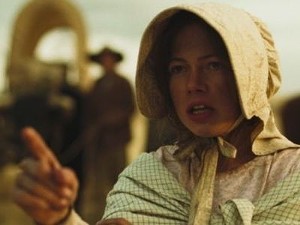The Way Things Weren't: Oregon Trail Odyssey 'Meek's Cutoff' is Just Plain Odd

Kelly Reichardt's minimalist cinema-of-the-inane hits a painfully low ebb with an anti-western lacking any sign of a narrative arc. Michelle Williams returns to working with Reichardt since leading the filmmaker's last effort Wendy and Lucy. Here Williams plays Emily Tetherow, an independent-minded young emigrant woman -- read proto-feminist icon -- traveling near the Oregon Trail with three families in 1845. The group of thirsty would-be settlers settlers hires a gregarious mountain man named Stephen Meek to guide them on a journey across the Cascade Mountains. Meek promises riches; they need water. Even with Meek's guidance, the group is lost on a misbegotten journey.
Bruce Greenwood is unrecognizable as the manipulative codger Meek, whose raspy voice and quick delivery briefly masks his ignorance about the frontier he pretends to master. Greenwood's fully-rounded characterization comes as a much-needed perk. Kelly Reichardt's regular script collaborator Jon Raymond provides a series of falsely dramatic episodes that lead nowhere. For example, it's a big deal when a stagecoach rolls unattended down an hill and crashes. A gun-stand-off is the highest dramatic pitch the story ever hits. The characters remain inaccessible. Stilted voice-over narration includes bible passages that reference "the tree of life." "God" looms large amid narrative desolation. The film's main dramatic grist comes from a Native American Indian (wonderfully played by Rod Rondeaux) who the group take prisoner. Mr. Meek is only too happy to brutalize the Native American who the group hopes will lead them to water. Emily, on the other hand, does what she can to win the man's trust. She stitches up his moccasins. The downtrodden prisoner, who doesn't speak English, affords Emily an opportunity to express her personal sense of justice. Williams's character effectively upstages Meek's racist ideas that he is want to impose on the entire group.
Reichardt's decision to shoot the film in 4:3 aspect ratio gives the picture a televisual feel. There are plenty of arty landscape shots and center-dominant compositions, each ineffectual in its own way. Kelly Reichardt references Robert Altman's McCabe & Mrs. Miller as an influence on Meek's Cutoff. Comparison between the films does not favor Meek's Cutoff. Altman's film is a thousand times more modern and texturally layered. McCabe & Mrs. Miller breathes with romantic tension. Different from Reichardt's film, Altman's movie is a character-driven story built of solid form. It doesn't hurt that its casting includes Julie Christie opposite Warren Beatty. Meek's Cuttoff shows a young filmmaker attempting to create an illusion of literary complexity. The story is hooked into a fairly bland allusion regarding the United States current personality crisis. Neither the director or screenwriter have any idea what they want to say. Everything is vague. They have a skeletal narrative structure and no need to build any budget-busting luxuries like stage sets. There isn't a fully developed storyline, and there aren't enough ideas in a movie that film snobs will congratulate themselves for adoring. Pishaw.
Rated PG. 104 mins. (C-) (Two Stars - out of five/no halves)






